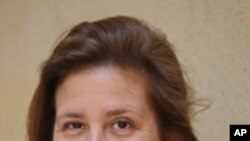In the final days before the first round in parliamentary voting in Egypt, many questions are being raised both in Egypt and in the international press about media freedom in Egypt. Egyptian publisher and human rights advocate Hishem Kassem told VOA Nov. 25 that the ruling regime had harassed both local and foreign media outlets but that broadcast media have faced the worst of the crackdown. However, Dr. Naila Hamdy, Professor of Journalism at the American University in Cairo, offers a different "take" on the state of Egypt's press.
Hilleary: We’re a few days before - what’s the mood in the press?
Hamdy: Well, actually, the media coverage of these elections has been probably more vibrant than any other we’ve seen for a long time. And we know the media scene is very different this time around. There are several independent newspapers, together with the official and semi-official newspapers. And we have a tremendous number of new television stations. So it is very, very vibrant. There’s a lot of focus on the upcoming election, and you have different opinions, different views, in ways that we have not seen before.
Hilleary: What about reports of harassment and crackdowns on the media?
Hamdy: Yeah, I can’t say it was a ‘crackdown,’ because there were several – you know, it was a series of stations that were given warnings or were not allowed to broadcast any longer. But they were not necessarily for political reasons. So, you know, it is a little bit difficult to say that there was a crackdown on media because of the parliamentary election.
It is the perception in the West, and I think it is a perception to some [Egyptians], but not necessarily to everyone, because if you will note that there were [sic] very little reaction to that in Egypt. It was not viewed, really, as a crackdown on the media because most of the stations have not any problems. And the newspapers continue, certainly, to cover the elections.
Hilleary: So what are you seeing in the blogosphere?
Hamdy: The blogosphere is really different because it appeals more to maybe younger people and certainly more of the sort of dissident voices. So it’s also active, and blogs are highly read right now.
Hilleary: There’s been no attempt to try and squelch them?
Hamdy: There’s not been any direct attempt that I know of.
Hilleary: Now, in the past, there have been allegations that the press has not had access to the polling stations.
Hamdy: Yes, but you know, the media always has to meet criteria, if you will, or have to have other press passes to cover elections. So that in itself is not unusual. Now, whether that’s going to be used to allow some media members who don’t favor the government not to cover is something that I can’t predict. But I’m not hearing that anyone is not allowed to cover the elections at the moment.
Hilleary: So what’s the general mood?
Hamdy: The general mood is tense. You know, we’ve - people have been talking about these elections for quite some time, and of course we have the sort of “question mark” about the next time period, and so this leads up to it. We’ve also had some sectarian problems, so it’s a very uncomfortable demonstration against the stopping of the building of a church in Giza, which is right next to Cairo.
And a lot of people feel that that is also related to the elections.
Hilleary: That was my next question. Do you believe this is related to the elections, and in what way?
Hamdy: You know, I don’t know that it is directly related to the elections, except that there are, I mean, it is a time where issues that bother people will come out, because the elections are coming up. And also because some politicians may think to use sectarian problems to their advantage. I think in that sense, it could be related.




